
Lieutenant-Colonel Sir John Augustus Hope, 16th Baronet, OBE (7 July 1869 - 17 April 1924) was a British soldier and politician.

Lieutenant-Colonel Sir John Augustus Hope, 16th Baronet, OBE (7 July 1869 - 17 April 1924) was a British soldier and politician.
Hope was son of Rev. Canon Charles Augustus Hope, Rector of Barwick in Elmet, Yorkshire [1] and the grandson of Sir John Hope, 11th Baronet. He entered the British Army when he was commissioned a second lieutenant in the King's Royal Rifle Corps (KRRC) on 22 May 1889, and was promoted to the rank of lieutenant on 1 July 1891 and to captain on 22 August 1897. [2] Major in 1905. He served in the Second Boer War in South Africa in 1901-1902 and was awarded the Queen's medal with 4 clasps. [3] He was back as a regular officer in the 3rd battalion of his regiment in early September 1902, [4] and was promoted to major in 1905. He later served in World War I with the 9th Battalion King's Royal Rifle Corps, was wounded and awarded the OBE in 1919.[ citation needed ]
He succeeded his uncle, Sir Alexander Hope, 15th Baronet (1824–1918), on 7 March 1918 as the 16th Baronet Hope of Craighall. [1]
Hope was an unsuccessful Unionist candidate for Midlothian at the December 1910 General Election, but was elected for the seat at a by-election in 1912. [5] In 1918 when the constituency was split, he was elected as Conservative member for Midlothian North and Peebles, which he held until 1922.
In 1910 Hope married the Hon. Mary Bruce, OBE, eldest daughter of Alexander Bruce, 6th Lord Balfour of Burleigh. [1] The couple had the following children:[ citation needed ]
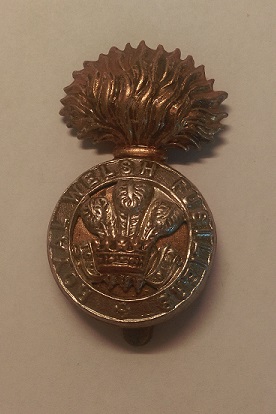
The Royal Welch Fusiliers (Welsh: Ffiwsilwyr Brenhinol Cymreig) was a line infantry regiment of the British Army, and part of the Prince of Wales's Division, that was founded in 1689; shortly after the Glorious Revolution. In 1702, it was designated a fusilier regiment and became the Welch Regiment of Fusiliers; the prefix "Royal" was added in 1713, then confirmed in 1714 when George I named it the Prince of Wales's Own Royal Regiment of Welsh Fusiliers. In 1751, after reforms that standardised the naming and numbering of regiments, it became the 23rd Regiment of Foot (Royal Welsh Fuzileers). In 1881, the final title of the regiment was adopted.

The Irish Guards (IG) is one of the Foot Guards regiments of the British Army and is part of the Guards Division. Together with the Royal Irish Regiment, it is one of the two Irish infantry regiments in the British Army. The regiment has participated in campaigns in the First World War, the Second World War, the Iraq War and the War in Afghanistan as well as numerous other operations throughout its history. The Irish Guards claim six Victoria Cross recipients, four from the First World War and two from the Second World War.

Alexander Hugh Bruce, 6th Lord Balfour of Burleigh, was a Scottish Unionist politician, banker and statesman, who took a leading part in the affairs of the Church of Scotland. He was Secretary for Scotland between 1895 and 1903.
Lieutenant Colonel Sir John Reginald Noble Graham, 3rd Baronet, was a British businessman, army officer and a recipient of the Victoria Cross, the highest award for gallantry in the face of the enemy that can be awarded to British and Commonwealth forces. He received the award "for most conspicuous bravery, coolness and resource when in command of a Machine Gun Section" during the Samarra offensive in 1917, during the First World War.
The Central Chancery of the Orders of Knighthood, or simply the Central Chancery, is an office of the Lord Chamberlain's department within the Royal Household of the Sovereign of the United Kingdom. It is responsible for the administration of orders of chivalry and some aspects of honours in general. It does not deal with nominations or decisions on appointments, but rather administers the appointment procedures and investitures, and provides the insignia. It is a small office, with eight staff in 2019.

James Francis Harry St Clair-Erskine, 5th Earl of Rosslyn, styled Lord Loughborough until 1890, was a Scottish soldier, author and aristocrat.

The Royal Lincolnshire Regiment was a line infantry regiment of the British Army raised on 20 June 1685 as the Earl of Bath's Regiment for its first Colonel, John Granville, 1st Earl of Bath. In 1751, it was numbered like most other Army regiments and named the 10th Regiment of Foot. After the Childers Reforms of 1881, it became the Lincolnshire Regiment after the county where it had been recruiting since 1781.
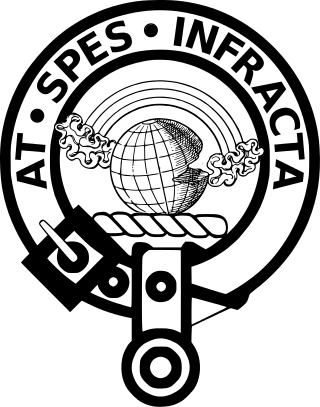
Clan Hope is a Scottish clan of the Scottish Lowlands.
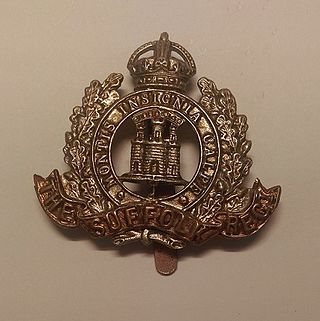
The Suffolk Regiment was an infantry regiment of the line in the British Army with a history dating back to 1685. It saw service for three centuries, participating in many wars and conflicts, including the First and Second World Wars, before being amalgamated with the Royal Norfolk Regiment to form the 1st East Anglian Regiment in 1959 which, in 1964, was further amalgamated with the 2nd East Anglian Regiment, the 3rd East Anglian Regiment and the Royal Leicestershire Regiment to create the present Royal Anglian Regiment.

There have been four baronetcies created for persons with the surname Hope, three in the Baronetage of Nova Scotia and one in the Baronetage of the United Kingdom. As of 2010 one creation is extant, one dormant and two extinct.

The Pechell, later Brooke-Pechell, later Pechell Baronetcy, of Paglesham in the County of Essex, was a title in the Baronetage of Great Britain.
Major Sir Alexander Bannerman, 11th Baronet was a pioneer British military aviator.
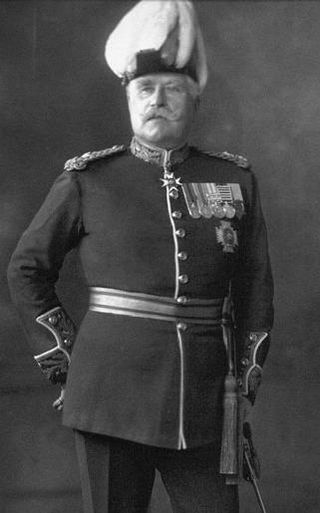
Lieutenant General Sir William Pitcairn Campbell, was a British Army general during the First World War.
The 1902 Coronation Honours were announced on 26 June 1902, the date originally set for the coronation of King Edward VII. The coronation was postponed because the King had been taken ill two days before, but he ordered that the honours list should be published on that day anyway.
The 1919 Birthday Honours were appointments by King George V to various orders and honours to reward and highlight good works by citizens of the British Empire. The appointments were made to celebrate the official birthday of The King, and were published in The London Gazette from 3 June to 12 August. The vast majority of the awards were related to the recently ended War, and were divided by military campaigns. A supplementary list of honours, retroactive to the King's birthday, was released in December 1919.

The Rangers was a volunteer unit of the British Army, originally formed in 1860. It provided a detachment for service in the Second Boer War, saw intensive action on the Western Front in the First World War, and served as motorised infantry during the Second World War during the campaigns in Greece and the Western Desert.
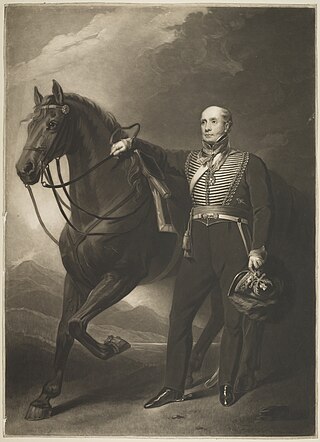
Sir John Hope, 11th Baronet was a Scottish aristocrat and politician.
Group Captain Sir Archibald Philip Hope, 17th Baronet, was a Scottish aristocrat and aviator who flew with the Royal Air Force during the Second World War.

The Exeter & South Devon Volunteers was the premier unit of Britain's Volunteer Force. Formed in 1852 it went on to become a battalion of the Devonshire Regiment. Both its active service battalions went to garrison India on the outbreak of the First World War, and then saw action in Mesopotamia and Palestine. In the Second World War, the battalion served in the garrison of Gibraltar. It continued in the postwar Territorial Army until it was merged with other West Country units. Its successors today serve in a reserve battalion of The Rifles.